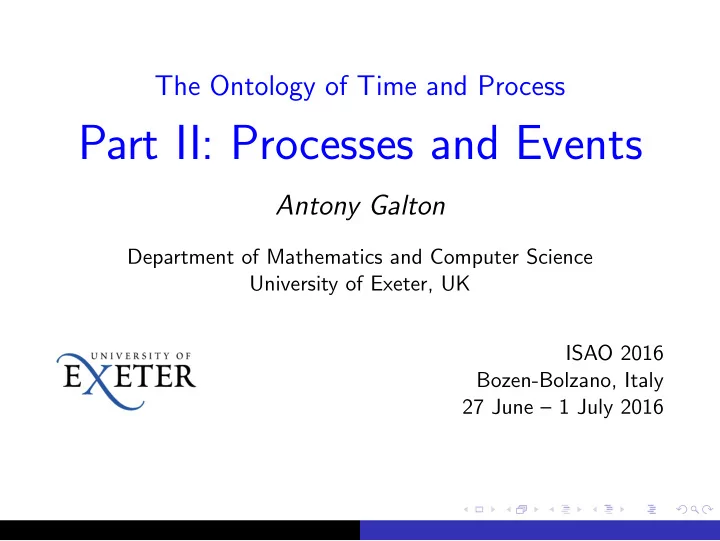

The Ontology of Time and Process Part II: Processes and Events Antony Galton Department of Mathematics and Computer Science University of Exeter, UK ISAO 2016 Bozen-Bolzano, Italy 27 June – 1 July 2016
One person’s process is another’s event, and vice versa. Michael F. Worboys, ‘Event-oriented approaches to geographic phenomena’ International Journal of Geographical Information Science 19(1):1–28,2005.
One person’s process is another’s event, and vice versa. Michael F. Worboys, ‘Event-oriented approaches to geographic phenomena’ International Journal of Geographical Information Science 19(1):1–28,2005. In fact it it worse than that . . .
�❅ situation � ❅ � ❅ � ❅ � ❅ EVENT STATE occurrence STATE � ❅ � ❅ � ❅ � ❅ . . . PROCESS PROCESS EVENT Moens and Steedman (1988) Mourelatos (1981) PROCESS � ❅ � ❅ continuous discrete � ❅ � ❅ EVENT STATE EVENT � ❅ Sowa (2000) � ❅ � ❅ � ❅ � ❅ � ❅ � ❅ � ❅ STATE PROCESS EVENT STATE PROCESS transition Allen (1984) Pustejovsky (1991)
There seems to be a lot of confusion here about the meanings of “process” and “event”. But there is ample evidence that in everyday life we have a fairly clear conception of what these terms mean, and the difference between them. Experiment: Google the phrase “not an event but a process”. Here is what I found . . .
A Common Understanding ◮ An event ◮ is a discrete “one-off” occurrence with a definite beginning and end, ◮ has a completion, ◮ typically lasts a short time relative to the temporal scale of the context in which it is described, ◮ or can even be instantaneous ◮ A process ◮ is open-ended, ◮ may continue indefinitely, ◮ may never reach a state of completion, ◮ may be extended over a long period, ◮ may be more or less homogeneous, but possibly involves a variety of different activities.
From the web-sites above, it appears that almost anything that happens can be claimed to be “a process rather than an event”. This is a clich´ e that people often utter with an air of apparent wisdom, as if they were providing a startling new insight that has passed lesser mortals by. Let’s try it out: Making an apple pie is a process, not an event In what sense, if any, is this true?
The Event case Making an apple pie has a definite beginning, it has a completion (when the pie is ready), it doesn’t take more than an hour or so. The Process case Making an apple pie involves a succession of different activities: cutting up the apples, preparing the pastry, assembling the pie, heating the oven, cooking the pie; it is by no means instantaneous.
Conclusion: Making an apple pie is both a process and an event. More exactly: What happens or goes on can partake of both event-like and process-like characteristics. Put differently: What happens can be described using “event language” or “process language”. These reflect two different points of view: the historical and the experiential .
Interlude “. . . two rather different kinds of description: historical and experiential. The importance of this distinction between two kinds, or modes, of description has often been recognized . . . . But there is no established terminology for it. The term used here, ‘historical’, is intended to suggest the narration of events, ordered in terms of successivity and presented dispassionately with the minimum of subjective involvement; and this mode of description clearly relates to the static, non-deictic, objective conception of time. The term ‘experiential’, on the other hand, is suggestive of the kind of description that might be given by someone who is personally involved in what he is describing; and this mode is no less clearly related to the dynamic, deictic, subjective conception of time.” John Lyons, Semantics , Cambridge University Press, 1977, p.688.
Aspects The difference between processes and events thus appears to be, not a difference between two different kinds of thing in reality, but a difference between two different ways of describing reality. In language, these different points of view show up as the aspects of the verb: perfective vs imperfective . In English this distinction is conveyed by the simple vs continuous tenses: ◮ What did you do yesterday? I made an apple pie. (An event) ◮ What were you doing when I called? I was making an apple pie. (A process)
The implications for ontology The above considerations suggest that: ◮ If the target of your ontology is to characterise the nature of reality as it is in itself, independently of the manner in which it is viewed or presented, then you should regard the difference between processes and events as outside the scope of the ontology. ◮ But if the target of your ontology is to characterise elements of reality from different points of view, so that one and the same entity may be classified in different ways in different contexts, then the difference between processes and events should be taken seriously as something to be enshrined in the ontology itself. In the next section we will see examples of both these approaches.
Recommend
More recommend